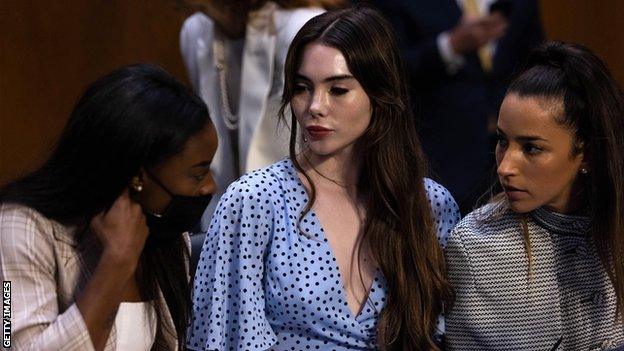Rachael Denhollander: More still to be done in gymnastics after Larry Nassar case
- Published
'There has not been much tangible effect from the Nassar case' - Denhollander
Former gymnast Rachael Denhollander says there is work to do to make the sport safer for children, and that there has not been "much tangible effect" from the Larry Nassar sex abuse scandal.
In 2018, former US gymnastics team doctor Nassar was imprisoned for 300 years for molesting gymnasts.
Denhollander, now 37, was the first gymnast to go public with allegations against Nassar, in 2016.
In December, Nassar's victims reached a settlement with USA Gymnastics.
As part of the settlement, among the largest ever for a sexual abuse case, the gymnasts are to receive $380m (£287m), and USA Gymnastics and the Olympic Committee will give board seats to survivors.
When asked by BBC Sport whether we are now closer to "things being better for children", Denhollander, who has four children and is a lawyer and advocate for survivors of abuse, said: "I wish I could say that we are. There really has not been much tangible effect from the Nassar case.
"The conversations are starting and they're being sustained more, and that's a very positive and healthy thing. Impact on legislative policy on conviction rates, that has not trickled down yet. Impact on institutional reform has not trickled down yet."
She added that the "impact on how we respond when it's in our own communities is really the test".
"What do you do when it's in your own community?" she said.
"Because child abuse is something we are all very happy to condemn. When it's that religious denomination or that athletic association or that university or this political group. What do you do when it's your political group? When it's your religious denomination, when it's your athletic community?
"What you do when it's your own community is the real test of how much you know and care. We have not had a shift yet in how we respond when it's in our own communities when it would cost us to care."
'We haven't really grappled with physical realities of trauma'

Olympic gold medallists Simone Biles, McKayla Maroney and Aly Raisman gave emotional testimony at a US Senate hearing in September 2021
Nassar was accused by more than 330 women and girls of sexual abuse at USA Gymnastics and Michigan State University.
Denhollander's account led to the testimonies of more than 200 women, including Olympic gold medallists Simone Biles, Aly Raisman and McKayla Maroney.
She said she believes there are thousands of gymnasts who have been the victims of sexual abuse in the United States.
She praised Biles, Raisman and Maroney for speaking out, acknowledging that it can at "a very significant cost" to them. "I'm deeply grateful that they did," she said. "I would also like to see us get to the point where one little girl who isn't a celebrity matters enough."
In 2020, British Gymnastics launched an independent review after a number of gymnasts alleged there was a culture of mistreatment in the sport.
And Denhollander said "we need to start looking" at what "authority figures at the top" are doing in order to bring about the radical changes required for the sport to move forward, adding that the culture in gymnastics "absolutely" still needed to change.
"The verbal and emotional abuse, the psychological abuse, the physical abuse - that has lasting damage on children on their sense of self and their sense of worth and identity, lasting mineralogical damage, and we haven't really grappled with the physical realities of trauma," she said.
"We think of it like a thought wound or a feeling wound but it really causes deep neurological damage. That doesn't just undo itself, and so when you grapple with the depth of the damage that comes from all of these forms of abuse, we cannot in good conscience justify not asking those hard questions and not making those kinds of radical changes.
"When the authority figures at the top are not asking those questions and not willing to submit to that process, what they're communicating with their actions is, 'we're going to pay lip service to not liking child abuse, but we're not going to care about them enough to actually do anything. Just listen to what we say, pay no attention to what we're doing'.
"We need to start looking at what they're doing."
Independent reviews fail to 'answer the hard questions'
Denhollander also said most independent reviews were "exercises in obfuscation" and failed to "answer the hard questions".
"They're not looking to lift that veil," she said.
"They're looking to do just enough that they can say, 'oh, we did an independent assessment, even though it wasn't done properly, and it wasn't set up correctly and it didn't have a fully public report that didn't have access to information, but we did the assessment'.
"And so when that's the motivation, if that's what's really going on, then again, what leadership is doing from the top down is saying, 'listen to what we say, don't pay attention to what we do'. That's not acceptable.
"[Gymnastics] has to heal with honesty and transparency. You have to be able to acknowledge what has gone wrong, so that you can change it going forward."

The Instagram Effect: What power does the platform hold over us?
'It's really dangerous': Dive into a raw and unfiltered motorsport with promise of high-speed crashes
